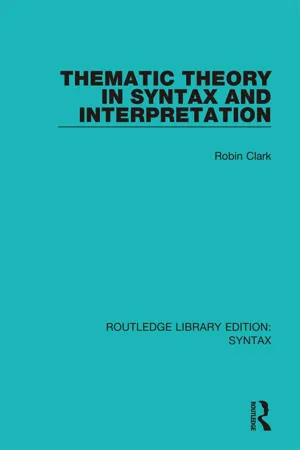
- 270 pages
- English
- ePUB (mobile friendly)
- Available on iOS & Android
Thematic Theory in Syntax and Interpretation
About this book
In recent years, lexical argument structure, in the guise of thematic roles, has come to play an increasingly important part in syntactic theory. The first part of this book, first published in 1990, explores the interplay between thematic role assignment and movement processes, with particular reference to the explanatory problem of nominalisation. The second part explores the relationship between thematic roles and control.
Particularly close attention is paid to implicit arguments, arbitrary control and adverbs of quantification. A theory of control is presented which unifies obligatory and non-obligatory control. The theory of control, furthermore, generalises to account for the binding gaps in purposive clauses, tough movement constructions, infinitival clauses and other constructions which have typically been analysed as involving long-distance dependencies. This title will be of interest to students of linguistics.
Frequently asked questions
- Essential is ideal for learners and professionals who enjoy exploring a wide range of subjects. Access the Essential Library with 800,000+ trusted titles and best-sellers across business, personal growth, and the humanities. Includes unlimited reading time and Standard Read Aloud voice.
- Complete: Perfect for advanced learners and researchers needing full, unrestricted access. Unlock 1.4M+ books across hundreds of subjects, including academic and specialized titles. The Complete Plan also includes advanced features like Premium Read Aloud and Research Assistant.
Please note we cannot support devices running on iOS 13 and Android 7 or earlier. Learn more about using the app.
Information
Table of contents
- Cover
- Half Title
- Title Page
- Copyright Page
- Original Title Page
- Original Copyright Page
- Table of Contents
- Preface
- 1 Introduction
- 2 On a certain class of nominals
- 3 Thematic domains and bounding
- 4 Control and non-overt operators
- Notes
- References
- Index